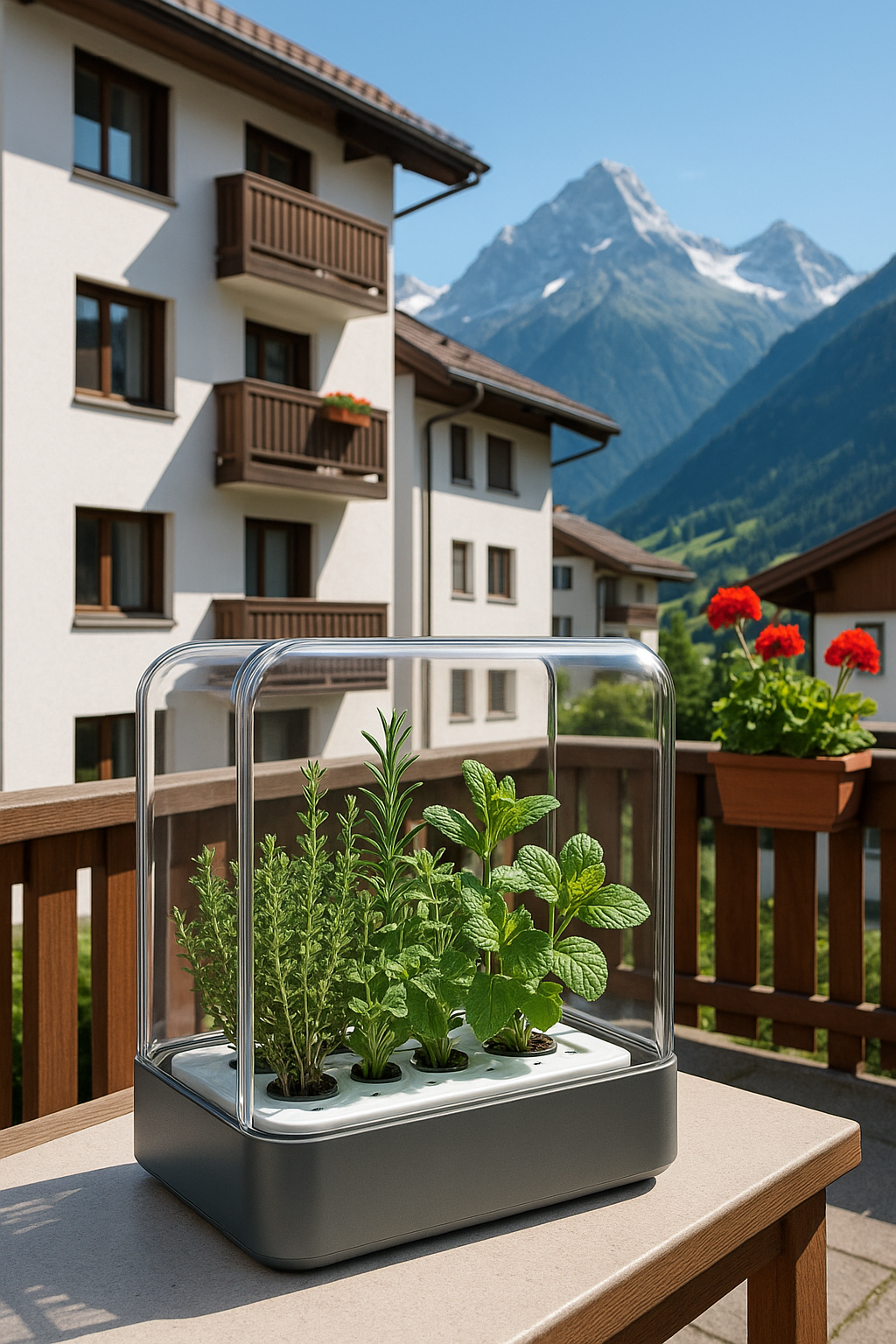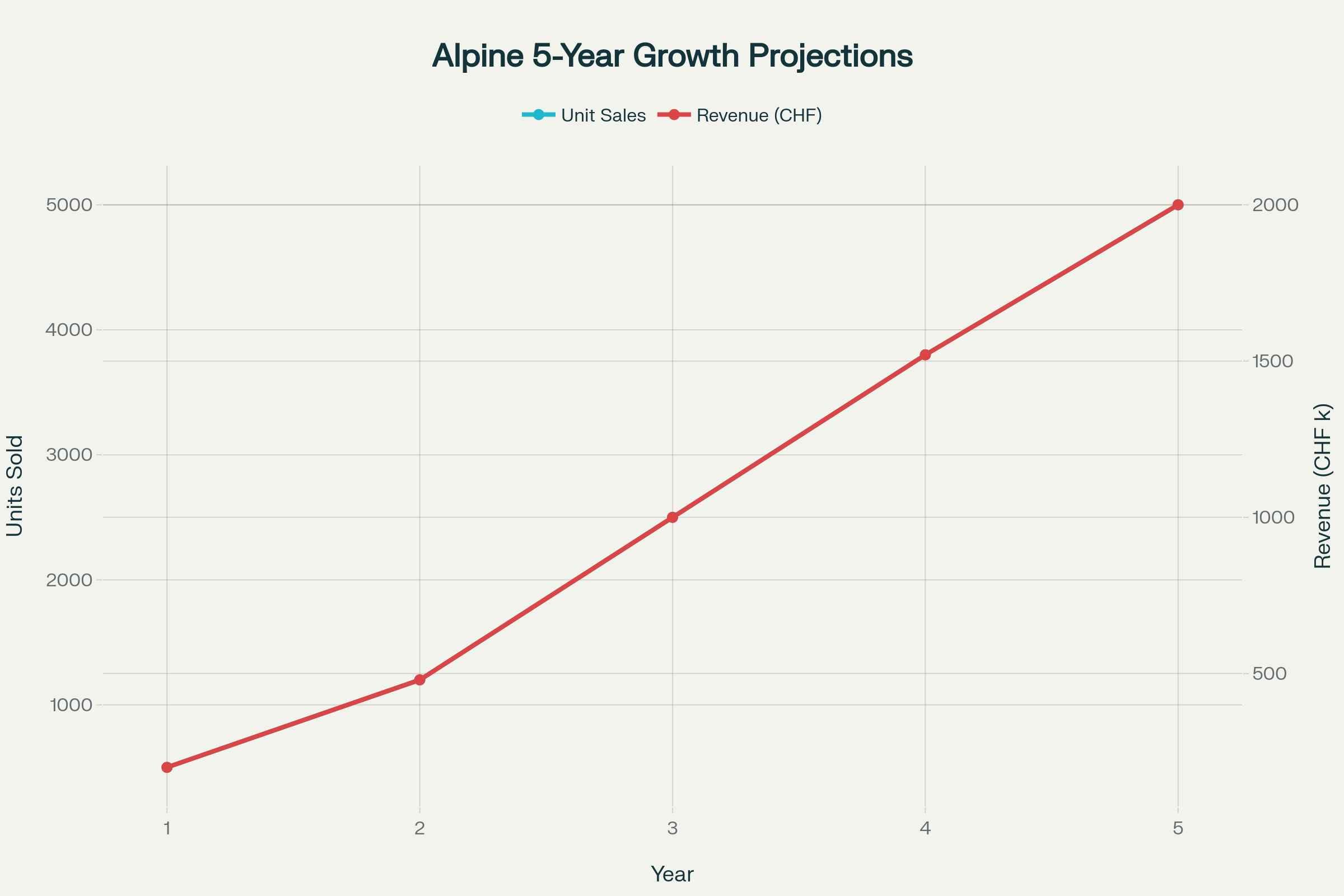Revolutionary compact hydroponic systems designed for Switzerland’s urban landscape can generate CHF 2 million annually by Year 5, tapping into a CHF 23.33 million domestic market with 11.5% growth potential.
With 75% of Europeans living in urban areas and Swiss apartments averaging just 60-80 square meters, balcony space represents untapped agricultural potential. Alpine Micro-Greenhouses offer a subscription-based hydroponic solution that transforms ordinary Swiss balconies into thriving herb gardens, combining Switzerland’s precision engineering heritage with the growing demand for local, sustainable food production.
![Compact hydroponic micro-greenhouse designed for Swiss balconies featuring local alpine herbs like Swiss chard]

Compact hydroponic micro-greenhouse designed for Swiss balconies featuring local alpine herbs like Swiss chard
Market Analysis & Opportunity
The Swiss hydroponics market presents exceptional growth opportunities, valued at USD 23.33 million in 2025 with an anticipated 11.5% CAGR. Meanwhile, Europe’s indoor farming sector reached USD 12.01 billion in 2023, growing at 12.3% annually. Urban gardening has become a worldwide trend gaining increasing popularity in Switzerland, driven by consumer demand for fresh, pesticide-free produce and sustainable living practices.
Target Market Demographics
Switzerland’s urban population represents an ideal customer base for compact hydroponic systems:
| Market Segment | Size | Characteristics |
|---|---|---|
| Urban Apartment Dwellers | 2.1 million households | Limited growing space, high disposable income |
| Health-Conscious Consumers | 77% seek sustainability | Premium willingness to pay for organic herbs |
| Tech-Savvy Early Adopters | 850,000+ professionals | Embrace innovative home solutions |
| Expat Communities | 25% of population | Desire fresh herbs from home countries |
The alpine herb extract market alone is valued at USD 1.86 billion globally and expected to reach USD 12.13 billion by 2032, indicating massive demand for fresh alpine herbs that micro-greenhouses can supply directly to consumers’ kitchens.

Alpine Micro-Greenhouse Business Analysis: Market opportunity, growth projections and profitability breakdown
Why This Business Has Exceptional Demand
1. Space Constraints Drive Innovation
Swiss apartments typically feature small balconies averaging 8-12 square meters, making traditional gardening impossible. Our micro-greenhouse systems maximize vertical growing space while maintaining aesthetic appeal for Switzerland’s design-conscious urban dwellers.
2. Premium Herb Market Gap
Fresh alpine herbs command premium prices in Swiss supermarkets:
- Swiss chard: CHF 4-6 per 100g
- Alpine thyme: CHF 8-12 per 50g
- Edelweiss: CHF 15-20 per plant
- Mountain sage: CHF 6-9 per 75g
Home cultivation eliminates markup while ensuring peak freshness and flavor intensity.
3. Subscription Economy Alignment
Swiss consumers already embrace subscription services across categories. Our seed-refill subscription model provides:
- Recurring revenue stability (CHF 25-40 monthly per customer)
- Customer retention through convenience and variety
- Predictable cash flow for business scaling
4. Sustainability Mandate
With Switzerland targeting carbon neutrality by 2050, locally grown herbs reduce transportation emissions while supporting circular economy principles that resonate with environmentally conscious consumers.
Business Development Strategy
Phase 1: Product Development & Validation (Months 1-6)
Prototype Creation
- Design compact units measuring 40cm x 60cm x 80cm to fit standard Swiss balcony furniture arrangements
- Integrate LED grow lights optimized for alpine herbs with energy-efficient consumption under 50W
- Include automated watering systems with 2-week reservoir capacity
- Develop climate control features suitable for Swiss weather variations (-5°C to 35°C)
Market Testing
- Partner with 3-5 Zurich apartment complexes for pilot installations
- Conduct focus groups with 200+ urban dwellers across German, French, and Italian-speaking regions
- Test seasonal performance during harsh Swiss winters and hot summers
- Refine designs based on user feedback and growing success rates
Phase 2: Production & Partnership Setup (Months 7-12)
Manufacturing Partnerships
- Source precision components from Swiss-German engineering firms to maintain quality standards
- Establish assembly partnerships with local workshops employing 10-15 people
- Secure sustainable plastic suppliers for weather-resistant greenhouse panels
- Develop relationships with Alpine seed suppliers for authentic local varieties
Technology Integration
- Create smartphone app for growing guidance, watering alerts, and harvest timing
- Implement IoT sensors for pH, nutrient levels, and growth monitoring
- Design subscription management platform for automated seed deliveries
- Build customer support systems in German, French, and Italian
Phase 3: Market Launch & Scaling (Year 2+)
Go-to-Market Strategy
- Launch in Zurich, Geneva, and Basel with direct-to-consumer online sales
- Partner with premium garden centers and design stores for retail presence
- Establish corporate wellness programs for office balcony installations
- Develop gift packages for holidays and housewarming occasions
Financial Projections & Profitability
Revenue Model Structure
| Revenue Stream | Year 1 | Year 3 | Year 5 |
|---|---|---|---|
| Unit Sales (CHF 400/unit) | CHF 200,000 | CHF 1,000,000 | CHF 2,000,000 |
| Subscription Revenue (CHF 30/month) | CHF 54,000 | CHF 432,000 | CHF 900,000 |
| Total Revenue | CHF 254,000 | CHF 1,432,000 | CHF 2,900,000 |
Cost Structure Analysis
Direct Costs (Per Unit)
- Materials & Components: CHF 120
- Assembly & Labor: CHF 40
- Packaging & Shipping: CHF 25
- Total COGS: CHF 185 (46% gross margin)
Fixed Monthly Costs
- Facility Rent: CHF 3,500
- Staff Salaries: CHF 18,000
- Marketing & Advertising: CHF 8,000
- Operations & Administration: CHF 4,500
- Total Fixed Costs: CHF 34,000/month
Profitability Timeline
| Year | Units Sold | Revenue | Gross Profit | Net Profit |
|---|---|---|---|---|
| 1 | 500 | CHF 254,000 | CHF 107,500 | CHF -150,000 |
| 2 | 1,200 | CHF 609,600 | CHF 258,000 | CHF 50,000 |
| 3 | 2,500 | CHF 1,432,000 | CHF 537,500 | CHF 229,500 |
| 4 | 3,800 | CHF 2,164,800 | CHF 812,000 | CHF 404,000 |
| 5 | 5,000 | CHF 2,900,000 | CHF 1,075,000 | CHF 667,000 |
Break-even Point: Month 18 with 1,100 cumulative unit sales and 350 active subscribers.
Step-by-Step Implementation Guide
1. Market Research & Validation
- Conduct surveys among 1,000+ Swiss urban dwellers about balcony gardening interests
- Analyze competitor pricing from existing hydroponic kit suppliers
- Test herb varieties for optimal growth in Swiss climate conditions
- Validate subscription pricing through pre-order campaigns
2. Product Design & Prototyping
- Collaborate with Swiss design studios for aesthetically pleasing units
- Engineer systems for -10°C winter performance with insulation options
- Create modular designs allowing expansion from 6 to 18 growing pods
- Integrate smart features compatible with popular Swiss home automation systems
3. Regulatory Compliance & Certifications
- Obtain CE marking for electrical safety compliance
- Secure organic certification for seed supply chains
- Register with Swiss Federal Office for Agriculture for plant variety approvals
- Ensure data privacy compliance for IoT features under Swiss law
4. Supply Chain Development
- Establish partnerships with 3-5 component suppliers for redundancy
- Secure Swiss-origin seed varieties from certified alpine herb growers
- Develop seasonal inventory management for year-round availability
- Create quality control processes ensuring 95%+ germination rates
5. Marketing & Customer Acquisition
- Launch influencer partnerships with Swiss lifestyle and sustainability bloggers
- Create content marketing program featuring recipe videos and herb guides
- Establish referral incentive program offering CHF 50 credits for new customers
- Develop corporate sales channel targeting offices and co-working spaces
6. Operations & Fulfillment
- Set up distribution center in central Switzerland for efficient shipping
- Implement customer service team fluent in German, French, and Italian
- Create maintenance and repair services for long-term customer retention
- Establish seasonal growing guides customized for Swiss climate zones
Potential Challenges & Strategic Solutions
Challenge 1: Seasonal Demand Fluctuations
Issue: Swiss consumers may reduce balcony gardening interest during harsh winters.
Solution:
- Develop indoor growing configurations for winter months
- Create holiday gift promotions during Q4 sales periods
- Expand to southern European markets with complementary growing seasons
- Offer winter herb specialties like rosemary and sage that thrive in cool conditions
Challenge 2: Competition from Established Players
Issue: Large gardening companies may enter the micro-greenhouse segment.
Solution:
- Build strong brand loyalty through superior customer service and Swiss quality
- Develop patent-protected innovations in compact growing technology
- Focus on local alpine herb varieties unavailable from international competitors
- Create community aspects through growing clubs and recipe sharing
Challenge 3: High Customer Acquisition Costs
Issue: Premium pricing may limit initial market penetration.
Solution:
- Implement freemium model with basic starter kits and premium upgrades
- Develop corporate partnership program reducing individual marketing costs
- Create subscription gifting options expanding customer base through recipients
- Launch seasonal rental program allowing customers to test before purchasing
Challenge 4: Supply Chain Disruptions
Issue: Component shortages could impact production schedules.
Solution:
- Maintain 90-day inventory buffer for critical components
- Develop alternative supplier relationships across multiple countries
- Create modular design philosophy allowing component substitutions
- Implement pre-order system providing demand visibility for planning
Revenue Diversification Opportunities
1. Corporate Wellness Programs
Partner with Swiss companies to install micro-greenhouses in office spaces, targeting the growing corporate wellness market worth CHF 500+ million annually.
2. Educational Institution Sales
Develop classroom-sized systems for schools teaching sustainability and agriculture, potential market of 3,000+ Swiss educational institutions.
3. Hospitality Industry Integration
Supply hotels and restaurants with fresh alpine herbs, creating B2B revenue streams estimated at CHF 200,000+ annually by Year 3.
4. International Expansion
Export systems to Germany, Austria, and France where alpine herbs command premium prices and urban gardening trends are accelerating.
Technology Integration & Innovation
Smart Features Development
- AI-powered growing optimization learning from customer success data
- Weather integration automatically adjusting watering and lighting schedules
- Harvest prediction algorithms optimizing flavor and nutrient content timing
- Social features allowing customers to share growing tips and recipes
Sustainability Initiatives
- Carbon-neutral shipping through Swiss postal service green programs
- Recycling program for old units ensuring circular economy principles
- Local sourcing priority supporting Swiss suppliers and reducing transportation
- Energy efficiency improvements targeting 40% power consumption reduction by Year 3
Conclusion
Alpine Micro-Greenhouses represents a CHF 2+ million annual revenue opportunity by addressing genuine market needs in Switzerland’s urban landscape. With 77% of Swiss consumers prioritizing sustainability, compact hydroponic systems perfectly align with environmental values while delivering premium fresh herbs year-round.
The business model’s strength lies in combining one-time hardware sales with recurring subscription revenue, creating predictable cash flows and strong customer lifetime value. By focusing on authentic Swiss alpine herb varieties and leveraging the country’s reputation for precision engineering, this venture can establish market leadership before competitors recognize the opportunity.
Success depends on meticulous attention to Swiss quality standards, multilingual customer service excellence, and continuous innovation in compact growing technology. With proper execution, Alpine Micro-Greenhouses can transform how urban Swiss households access fresh, sustainable herbs while building a profitable, scalable business.
For entrepreneurs seeking professional assistance with Swiss company formation and regulatory compliance, BMA Business Solutions provides comprehensive support for establishing successful ventures in Switzerland’s dynamic business environment. Visit https://bma-business.com/swiss-company-registration/ to begin your entrepreneurial journey with expert guidance.


